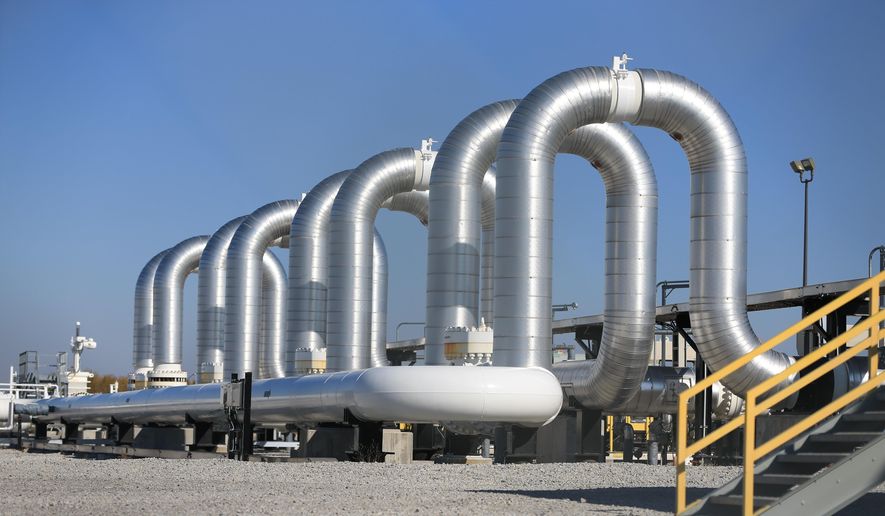After nearly a decade of debate that turned the project into a national flashpoint over energy development and environmentalism, the Keystone XL oil pipeline cleared Monday what looked to be its final regulatory hurdle in Nebraska — but it’s still not clear whether the project will be completed.
Nebraska’s Public Service Commission voted 3-2 on Monday morning to approve a route for Keystone, seemingly giving TransCanada, the owner and operator of the project, the last green light it needs to finish the $8 billion Canada-to-Texas pipeline.
Although TransCanada now has all of the approvals necessary, the path approved Monday isn’t the company’s preferred route through the state. Rather than celebrating the decision and vowing to break ground immediately, TransCanada took a much different tone after the vote and offered no assurances that it will use the PSC-approved permit.
“As a result of today’s decision, we will conduct a careful review of the Public Service Commission’s ruling while assessing how the decision would impact the cost and schedule of the project,” said Russ Girling, TransCanada Corp.’s president and CEO.
Keystone, which has been debated for nearly a decade and was shelved by the Obama administration before President Trump resurrected it in March, has encountered more regulatory red tape, technical delays and legal challenges than any other pipeline in American history. The vote Monday was widely seen as the final chapter in that process, but PSC members say that may not be the case.
Crystal Rhoades, a member of the commission who voted against the pipeline, said changes to TransCanada’s initial route may have left some state landowners in the dark. Ms. Rhoades argued that the state had conducted extensive environmental study of the first plan proposed by TransCanada but failed to adequately study the path approved Monday.
“There are at least 40 landowners along the approved route who may not even know their land is on this pipeline’s path,” she said, adding that she is not convinced the pipeline will deliver any real economic benefits to the state.
The three commission members who voted yes on the project did not defend their positions during the brief meeting.
Environmentalists condemned the PSC’s decision but also seized on the confusion about the routes, raising fresh questions about whether the approval is valid and whether it would hold up in court.
“Today’s decision complicates TransCanada’s plans for the Keystone XL pipeline. Nebraska did issue a permit, but it wasn’t the one that TransCanada wanted. While it isn’t clear what this ultimately means for TransCanada’s ability to build, one thing is certain — people who oppose the new pipeline will throw everything they have got at stopping it,” said Rachel Rye Butler, a tar sands campaigner with the environmental activist group Greenpeace.
Supporters of the project largely ignored questions about the legality of the route and instead celebrated the fact that Keystone finally has a path through Nebraska.
“The Nebraska Public Service Commission set an example for how to carefully evaluate critical energy infrastructure projects, even in the face of strongly held views and opinions,” said Jack Gerard, president and CEO of the American Petroleum Institute. “It’s been a long path to today’s approval, and the commission should be commended. Their action allows the Keystone XL pipeline to be built by highly trained, skilled tradesmen using state-of-the-art technologies aimed at protecting the environment and promoting the safety of our communities.”
The oil and gas sector has championed the project — which would carry more than 800,000 barrels of oil each day from Alberta to refineries on the U.S. Gulf Coast — since the early days of Mr. Obama’s tenure. The 44th president ultimately shot down the project as part of a broader policy to move the U.S. away from fossil fuels. His decision pleased environmental supporters but angered labor unions and others, including some Democratic lawmakers who argued that Keystone would promote energy independence and spur economic growth.
The Obama administration’s environmental reviews of the project found it would have little or no impact on greenhouse gas emissions and would create more than 40,000 jobs, though the vast majority of those positions would be temporary.
After seizing on the issue during his presidential campaign, Mr. Trump revived the pipeline during his first few months in office, signing an executive order to expedite construction. Presidential approval is needed for Keystone because it crosses the U.S.-Canada border.
“The fact is that this $8 billion investment in American energy was delayed for so long, it demonstrates how our government has too often failed its citizens and companies over the past long period of time,” Mr. Trump said in March. “Today we take one more step in putting the jobs, wages and economic security of American citizens first.”
Late last week, the pipeline’s future was again thrown into doubt after an existing portion of Keystone leaked more than 210,000 gallons of oil in South Dakota. Environmentalists and other opponents said the leak was more evidence that the pipeline was unsafe and should be rejected.
But under Nebraska state law, the public service commission could not consider the South Dakota spill in its decision-making process. State law maintains that pipeline safety is a responsibility of the federal government.
• Ben Wolfgang can be reached at bwolfgang@washingtontimes.com.




Please read our comment policy before commenting.